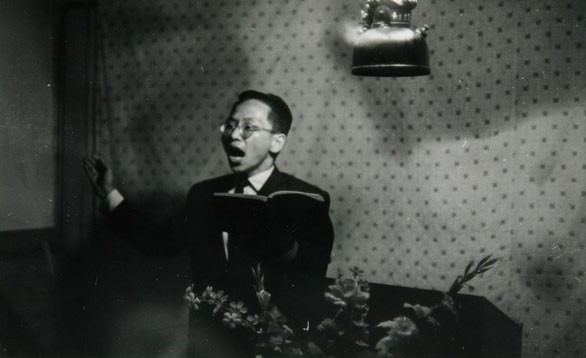The afternoon Bible study in what was then called Saigon began as most others, with a group of curious Vietnamese nationals walking into a small, nondescript home. They attended for a variety of reasons, but primarily to learn English and to satisfy their curiosity about this new faith called Christianity.
It was a typical hot, muggy day in 1961 in the country that had been divided by the Geneva Convention in 1954. Families were separated by a demilitarized zone that kept the communist forces in the north and the pro-democracy forces in the south separated yet not necessarily at peace.
Le Quoc Chanh, a young man in his early 20s, was one of those who walked through the doors that day, searching for answers; he emerged as the first Vietnamese convert to Christianity through the missionary work of Southern Baptists. The unassuming Chanh would shape the future of the denomination’s work and pave the way for the planting of congregations that exist more than 60 years later.
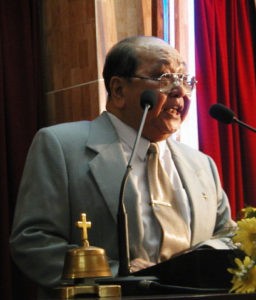
Pastor Chanh later in life at Grace Baptist Church.
Chanh and his mentoring legacy established a network of churches that survived war time in various forms and continue to thrive today. He died in retirement on April 6, 2021, just four months after attending the 58th anniversary of Grace Baptist Church, the congregation that grew out of the Bible study and where he later served as the first Vietnamese pastor for nearly four decades.
Southern Baptists in Vietnam
Southern Baptist work in Vietnam began with the arrival of missionary couples between 1959 and 1961. Upon request from American military personnel and other expatriates, they began providing worship and Bible study opportunities. The gathering of English speakers eventually attracted local Vietnamese as well.
Chanh’s encounter with Southern Baptists might have taken a different path if he had followed his original intentions. He later explained how he had been from a troubled home and had lost hope of anything improving in his life. A couple of days before attending the Bible study, he saw his opportunity to end his life by suicide by stepping in front of a bus. As he eased himself to the curb and the bus drew closer, he suddenly changed his mind.
Instead of ending his life, he gave himself one last opportunity by attending the home Bible study. During that service led by missionary Lewis Myers, Chanh accepted Christ with a zeal that would define him for the rest of his ministry.
Instead of ending his life, he gave himself one last opportunity by attending the home Bible study.
Myers, now retired and living in suburban Richmond, Va., with wife, Toni, relates how the young man became the first Southern Baptist convert in the nation, first Vietnamese pastor of the church that would grow out of the Bible study, and establish himself as a fervent church planter who mentored legions of others.
Storm clouds gathering
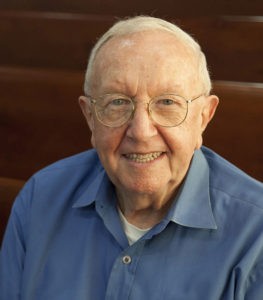
Sam James
Sam James and his wife, Rachel, arrived in 1962 when Southern Baptist work was only about three years old. Even then the few missionaries could sense that storm clouds were on the horizon as guerrilla warfare from the North began to escalate. Their plan was to start churches and transfer them to Vietnamese pastors as soon as feasible.
In 1964, James assumed the pastorate of the small house church and, three years later, founded Vietnam Baptist Theological Seminary with Chanh as one of its first students. The plan was to create a pipeline of pastors to assume leadership for the new congregations. In addition to being the nation’s first convert, the young man set another “first” when he and another student were the first to graduate and the first to be ordained.
Myers and James especially recall Chanh’s commitment to his newfound faith. Years later, his influence, navigating between extremes such as Communist Party leaders and new believers, would become legendary.
Speaking of the seminary days, James remembers Chanh as “a real Bible scholar from the beginning. I remember walking by his and his wife’s room late at night on more than one occasion and hearing them crying and praying for their countrymen,” James explains. “That’s just the kind of people they were … totally committed with no wavering from their calling.”
James adds that the young man’s faith “ran very deep and was revealed in unusually well-crafted sermons. That dedication served him well for more than four decades before his retirement.”
Building a church amid a war
In 1969, needing room to expand, the Vietnam Mission secured a Lottie Moon Christmas Offering grant for the house church, and the next year the congregation moved into a larger remodeled home. Chanh, in the meantime, had begun a church in suburban Saigon and was establishing himself as a gifted pastor and church planter.
In 1970, Chanh was called as pastor of the church meeting in its newly remodeled facility with an apartment provided for his family in the rear of the structure. It was the launch of his ministry that would see radical social change on the peninsula.
In March 1975, as tensions between the North and the South increased, thousands of Vietnamese began searching for ways to flee the nation. Knowing they would be judged, persecuted and imprisoned, pastors began looking for ways to leave.
James says that just days before the fall of Vietnam, “Pastor and Mrs. Chanh, their daughter and small son came to my home for a visit. As we talked about the situation, Pastor Chanh said he and his family had been offered a way of escape and he said that he and Mrs. Chanh would pray for God’s guidance.
“God called me to be a shepherd, a pastor, and he gave me a flock to shepherd. I can never abandon my sheep. We have decided that we will remain in Saigon and here I will stay.”
“Two days later, they returned, and he said, ‘A good shepherd never abandons his flock. God called me to be a shepherd, a pastor, and he gave me a flock to shepherd. I can never abandon my sheep. We have decided that we will remain in Saigon and here I will stay.’
“With that he left. It was not until 14 years later that I was able to see him again.”
Pastor Chanh persists
The missionaries eventually left, frequently under the cover of darkness, and the seminary was closed. They left confident they had planted ministries that were purely Vietnamese in nature and free of any political affiliation with pro-democratic forces.
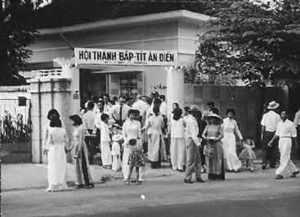
First home of Grace Baptist Church
Chanh led the congregation and many house churches through the fall of the nation and years of persecution. Every Baptist church with a building was closed with the exception of Grace, largely due to his negotiating skills and reputation with government officials.
“Grace never closed and remained open with government permission. I don’t think it ever missed a single Sunday,” Myers said.
That was because Chanh stayed above politics, keeping his ministry focused on evangelism and church planting from a purely Vietnamese perspective free of American influence. It was a strategy that would prove valuable.
“Chan had a winsome smile that would melt you instantly,” Myers remembered.
Negotiating with communist leaders for a new building
In 2004, as Saigon continued its reincarnation as the highly prosperous Ho Chi Minh City, the new government announced plans to widen the boulevard on which the church had relocated. City officials announced they would be taking half the property. With more than 10 million residents, land for relocation was largely unavailable for the church.
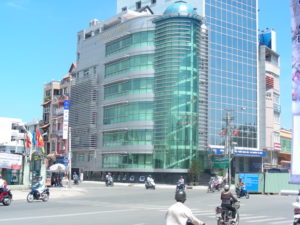
Current home of Grace Baptist Church in Saigon (Ho Chi Min City)
Chanh, playing off his contacts with the government leaders, began lengthy negotiations for some form of reimbursement. Onlookers were surprised at how well Chanh conducted himself while politely staying focused on his demands. He never questioned the authority of those in power and eventually received a generous settlement from the city — the property would be purchased for enough funds to almost construct a new building.
But due to the cost of land, the structure would need to be built as a high-rise. The congregation launched a fundraising campaign to construct a state-of-the-art structure. Today the eight-story building serves as the sanctuary and educational space and houses the Vietnamese Baptist Convention — which the government did not allow to form until 2008 — and the Vietnam Baptist Bible Institute.
“There is little doubt that the integrity with which he dealt with the government through 33 dark years made the difference in the way the government treated him in the process,” James said.
A man of integrity
The retired missionary, who eventually spent 13 years in the nation before the war, said that in recent years on a return visit, he heard a communist official related to individuals in the office that deals with Christian churches say they were “always respectful of Pastor Chanh. He told me, ‘We always know that Pastor Chanh is never intimidated or reluctant to tell the truth, whatever the consequences.
“‘He is always a man thoroughly committed to telling nothing but the truth. Also, he is a very stubborn man. No matter what we command him to do, he never agrees if it does not meet his ethical or religious standards. He is a man of absolute integrity. We highly respect him even if we do not agree with him.”
“‘He is always a man thoroughly committed to telling nothing but the truth. Also, he is a very stubborn man.”
Myers and his wife, Toni, heartedly agree. “We saw so much potential in that young man from the beginning,” Myers said from his home in suburban Richmond.
“Whenever he made up his mind you could not change him; that proved to be a valuable asset. He had a strong commitment to both sharing his faith with others and working through the government to expand the ministry of the church at a time when believers were not held in high regard.”
The pastor was known as a witty yet serious individual who welcomed government observers sent to listen to his sermons. Chanh saw their presence not as an intrusion but as a ministry opportunity.
“We saw that his faith ran very deep and was revealed in unusually well-written sermons,” James added. “That dedication served him for more than four decades before his eventual retirement.”
Chan’s health eventually began to fade after he stepped down from the pulpit, and he lost his vision in retirement. But in November 2020 he made a surprise return for the church’s 58th anniversary. Today his son, Le Quoc Hoy, continues the Grace’s legacy as pastor of the nearly 500-member congregation.
Joe Westbury is a veteran Baptist journalist based in Atlanta.

